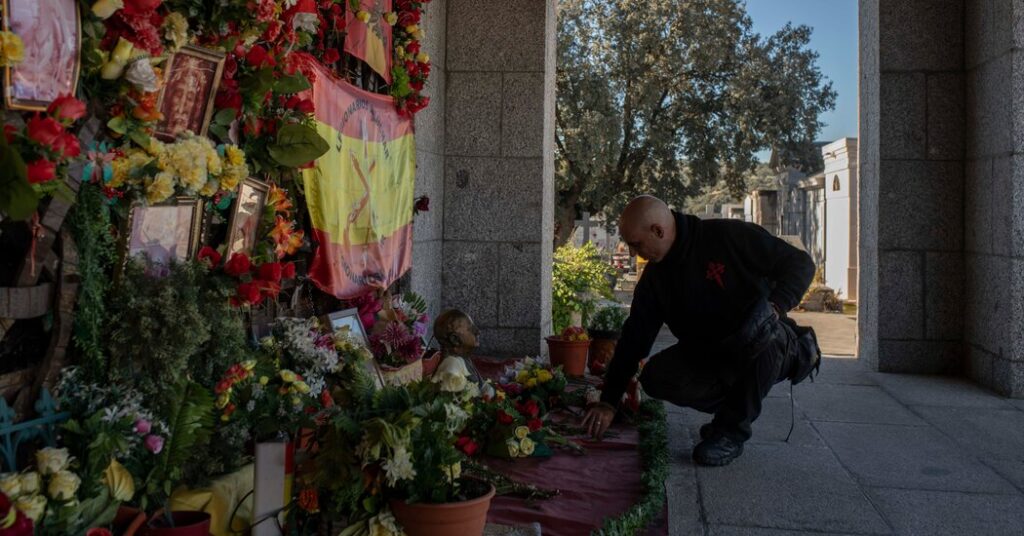This week, a pilgrim to the tomb of the Spanish dictator Francisco Franco wheeled a camouflage duffel bag of plastic flowers and flags to a shrine of banners and busts, crowns and crosses.
“I would like the regime to come back,” said José Luis Ortiz, 50, who was born weeks after Franco died and who used a vacation from his job as a janitor on Spain’s eastern coast to tend to Franco’s crypt outside Madrid. A supporter of the fascist Falange party, Mr. Ortiz talked about dictatorial glory days and “all that Franco gave the Spanish.”
Thursday is the 50th anniversary of the death of Franco, who has now been gone longer than the 39 years that he ruled as the Generalísimo lording over Spain’s military dictatorship. In 1936, Franco, an ally of Mussolini and Hitler, staged a military coup that turned into a bloody three-year civil war in which Communist-backed forces were defeated and Franco began a four-decade autocracy. Over that time, he suppressed free speech, imprisoned dissidents and repressed the country’s linguistic and cultural minorities — while pleasing his supporters by improving infrastructure and the economy.
Since Franco’s death, his legacy has been fiercely contested by the left and the right and everyone in between. But instead of just fading away, that debate has intensified recently as young conservatives, many of whom back Spain’s surging hard-right party, join the calls to revive the dictator’s image.
In recent days, the country has been wrestling with a national survey showing that 20 percent of Spain’s youth have a positive view of the Franco dictatorship. Social media channels of young voters teem with pro-Franco content.
The left-wing government of Prime Minister Pedro Sánchez has responded with “Spain in Freedom,” a yearlong campaign that is timed to the anniversary and urges Spaniards to appreciate all their freedoms. The government’s Ministry of Territorial Policy and Democratic Memory, responsible for recognizing and addressing the legacy of Franco’s dictatorship, will be holding events and talks and handing out T-shirts promoting free speech, even for awful opinions.
The campaign will also offer social media training for influencers to demythologize the dictator, which officials acknowledge may be a more urgent goal. They are connecting podcasters to people who suffered under Franco and will introduce a comic book about the Franco regime for elementary-school children. They have even discussed an escape room that would evoke life under the dictatorship. A game app called “Kill Democracy” is on the way.
“When you know what a dictatorship is, you can really appreciate what you have now,” said Carmina Gustrán, a historian who is running the ministry’s campaign. She said the efforts were more about the post-Franco transition to democracy than about Franco’s regime but also served as a reminder of “why we don’t want to go back there.”
The country’s conservative opposition is either ignoring the government’s campaign or livid over it. Some have called the program “absurd necrophilia” or a “smoke screen” for the left to promote a woke agenda that the critics consider autocratic. Among the country’s young conservatives, some now see anti-establishment appeal in reclaiming a dictator who they say got a bad rap.
“He did really good things for Spain,” José Luis Revuelta, 25, said in a boisterous bar in Madrid as he brought fresh beers for his friends. They offered a chorus of Franco achievements — roads, housing, family values, artificial lakes. Mr. Revuelta and his friends, all supporters of the growing far-right party Vox, said their grandparents had taught them, “Everyone lived better under Franco. Everyone.”
In a cafe popular with conservative young professionals in a wealthy part of Madrid, Álvaro Valderrabano, 22, an aerospace engineering student, said that for young people contending with widespread youth unemployment and uncertainty, Franco represented “stability and opportunity.”
His girlfriend, Alejandra Echarri, 22, is a law and business student. She said that young people, including those who supported Franco, were bothered by what she saw as progressive overreach and censorship, and that they felt part of a “countermovement” to the right.
That trend is not limited to Spain, and it is concerning to liberals accustomed to counting on the young for support. Champions of democracy are also horrified to see a growing nostalgia for authoritarianism.
“The best thing to do with the past, starting with its darkest aspects, is to try to understand it,” wrote Javier Cercas, a prominent Spanish novelist and a columnist for a special series in the newspaper El País about the 50 years since Franco’s death. “That’s the only known way to master it and prevent it from mastering us, forcing us to repeat the same mistakes over and over.”
But in Spain, nostalgia for Franco never really went away. The need for compromise after his death left many of his followers in positions of power, especially in the police, army and banking sector. For decades, Spain’s democratic leadership was reluctant to open the mass graves of Franco’s opponents who were killed during the civil war and dictatorship. Ms. Gustrán, the government official, lamented that the leftist governments of the 1980s and 1990s, so eager to join the European Union as a modern state, didn’t want to look back and reckon with Franco’s history.
But she said that in addition to trying to balance views online, the current government was exploring offline options. The ministry officials are exploring the possibility of the Franco-era escape room, in which a player would try to track down a friend active in pro-democracy movements “and get to him before the police do.” Then there was Kill Democracy, a game app for smartphones in which players try to undermine democracy by censoring journalists, manipulating the courts or jailing opponents. The point, she said, was to demonstrate the tenuous nature of freedom, though she allowed there was a risk that some might overlearn the lesson. She said she wondered at first, “Are we giving them ideas?”
But some Spaniards didn’t need any. Far-right fans of Franco visit Franco-themed bars and restaurants around the country. In one such bar in Madrid, wine bottles and tabletops adorned with the dictator’s face sit below walls papered with far-right and white-supremacist slogans, including one reading “Adolf Hitler Was Right.”
For all the supporters seeking to rehabilitate Franco’s reputation, the dictator has not exactly rested in peace in recent years.
In 2019, Mr. Sánchez exhumed Franco’s remains from the Valley of the Fallen, a towering mausoleum the dictator had carved over 18 years into a mountain topped by the world’s largest cross. Security guards inside the mountain’s gaping basilica have grown exhausted at pointing out where, behind the altar, the dictator’s tomb once sat. But the monument still holds more than 33,000 bodies, many of them Franco’s soldiers, as well as the unmarked graves of those they killed, and war prisoners who died building the mausoleum.
Conservatives saw the exhumation of Franco as an attempt by Mr. Sánchez, whom they loathe, to open wounds for political gain.
“A desecration,” Belén Roa, 64, said after eating lunch with friends, including a duchess, in a restaurant near Franco’s former tomb. She blamed Mr. Sánchez and the Freemasons but said the good news was that “young people are waking up” to what she called the government’s efforts to “erase the past.”
Back at Franco’s actual grave, Mr. Ortiz, the janitor, moved on to sweep the tombs of other prominent members of the Franco regime, including a potential successor assassinated by Basque separatists. He looked forward to a small event commemorating the dictator at the tomb on Thursday.
“If Franco had lived another 50 years,” he said, “it would have been better.”
But even as culture warriors and politicians argue over Franco’s memory, the reality for many Spaniards is that he is a historical, if increasingly forgotten, fact. For them, the anniversary and the government’s plans are peripheral at best.
“It doesn’t mean anything to me,” said Manuel Paredes, a 62-year-old engineer, who paused from riding his bike through the surrounding park to take a break, refill his water bottle and eat a banana on a wall of the dictator’s tomb.
“I’m here,” Mr. Paredes said, “for the water fountain.”
José Bautista contributed reporting
Jason Horowitz is the Madrid bureau chief for The Times, covering Spain, Portugal and the way people live throughout Europe.
The post Franco Died 50 Years Ago, but He’s Still Winning New Fans in Spain appeared first on New York Times.




